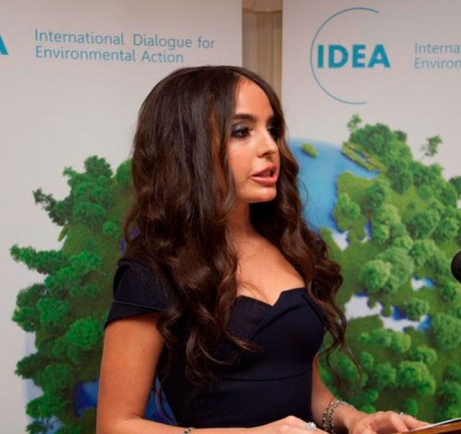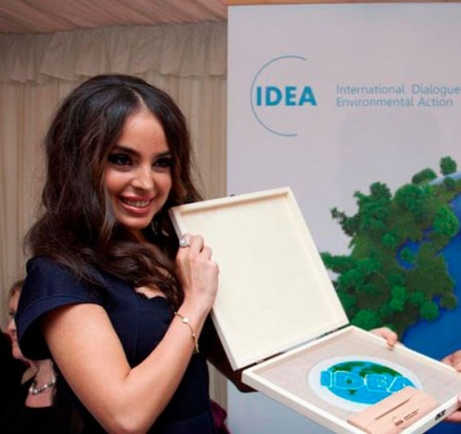
Family values are deep-rooted in Azerbaijan, and have been passed down from generation to generation since time immemorial. Care of youngsters, and respect for the elderly are cherished traditions in our country.

Mohamed Sheikh, a member of the UK House Of Lords, hosted an official reception in the Lords on the occasion of the presentation of international environment campaign IDEA (International Dialogue on Environmental Action) by Vice-President of the Heydar Aliyev Foundation, Mrs Leyla Aliyeva, on March 23rd.
The presentation ceremony was organized by the UK`s EcoMuslim Organization and the Azerbaijani Embassy in the UK.
In his opening remarks, Founder-Director of the EcoMuslim Organization, Omar Faruk, stressed the main directions of Azerbaijan`s development and recent environmental initiatives in the country, and spoke of the importance of IDEA's activity for South Caucasian nations.
Speaking at the event, Lord Sheikh noted the importance of the event and highlighted the increasing role of Azerbaijan in regional and global policy. He briefed attendees on bringing many geo-economic, transport and energy projects to fruition in the country, and discussed Azerbaijan’s developmental, economic and political initiatives which have been achieved in the country over the past years.
Speaking of the environment problems and initiatives supported by the House of Lords, Lord Sheikh also underscored importance of activities as part of the IDEA Environment Campaign.
Addressing the event, IDEA initiator Leyla Aliyeva briefed the participants on environmental projects implemented by the Heydar Aliyev Foundation and its cooperation with UNDP to mobilize Azerbaijani youth for Rio+20 conference.
The Vice-President of Heydar Aliyev Foundation also touched on IDEA volunteers` activity in secondary schools. She added that kids should learn about environmental education from childhood. They ought to know about the protection of environment in elementary and secondary schools. Young people should understand the importance of environmental harmony, learn how nature preserves life and understand the effect of their daily actions on the environment. Teachers can give children of all ages the knowledge, skills and values important for sustainable life. The main objective of the campaign is to highlight the role of primary education in ensuring the correct behavior to live in harmony with the environment.
Mrs Leyla Aliyeva stated that the South Caucasus is a region with rich environmental biodiversity. This region has subtropical forests, summits in the Great Caucasus Mountains covered with glaciers & snow, and steppes & semi- deserts in the lowlands.
Almost all known climatic zone types exist in the South Caucasus. For instance, Azerbaijan has 9 out of the 11 recognised climatic zones.
Mrs Aliyeva said that the Caucasus region is very sensitive to climate change, and this should be taken into account in planning all economic projects. Negative consequences of climate change may impact all spheres - from agriculture to tourism, and in particular in the water sector.
After the collapse of the Soviet Union a number of environmental problems likely to create environmental, health and economic threats, occurred in this region. Illegal hunting, destruction of pastures and forests and uncontrolled urbanization put the biological diversity in the region at risk. All the South Caucasus states have ratified the Convention on Biological Diversity, and other relevant international documents and undertaken obligations to protect the environment.
But active and suspended conflicts in the region have had negative impacts on the ecosystem. Setting fire to forests in the occupied lands of Azerbaijan has created danger for wild flora and fauna. Unique animals such as Caucasian leopard have faced a risk of danger.
A number of ecological dangers in three countries of South Caucasus are reflected in the areas characterized with a serious ecological decline. Sources of ecological dangers to people are seen not only in forest destructions, incorrect use of natural resources, water pollution and natural disasters, but also in industrial production, and nuclear and radioactive waste.
Construction of a new energy block at the Armenian nuclear power plant (NPP) in Metsamor is a major blow to environmental security in the region. Azerbaijan is the only South Caucasus country that has ratified the UNECE Water Convention. Lack of intent to cooperate on the settlement of problems in the field of trans-frontier water resources has caused pollution of subsoil and surface riches, reduction of river waters and water shortage.
Cooperation among young members of society becomes a vital element for protection of environment in the light of the environmental threats faced by the region. These threats prove that environmental challenges must be resolved by strengthening international environmental management.
Giving detailed information about her country, Mrs Leyla Aliyeva also spoke of Azerbaijan`s history. She said: “I am proud to be born in the first Muslim country which established the first parliamentary Republic in the East, granted women equal political rights with men in 1918 and accepted progressive Western values. Azerbaijan is the home to the first opera, first musical comedy, first theatre in Western style and first ballet in the Eastern world. Also, the first secondary school for women in the Muslim world was built here. My country is the land of the “firsts” and has always been known for tolerance, religious and cultural diversity, traditions. Azerbaijan is the land of interconnections - Europe and Asia, East and West.”
Following the official reception Leyla Aliyeva handed over traditional gifts embodying Azerbaijan to Lord Sheikh on behalf of the Azerbaijani delegation.
The event was attended by members of the British parliament, representatives of diplomatic corps accredited in this country, representatives of ecologic organizations, Azerbaijani Minister of Ecology and Natural Resources Huseyngulu Bagirov, Head of the Political Analysis and Information Provision Department at the Azerbaijani Presidential Administration Elnur Aslanov, SOCAR Vice-President for Environmental Issues Rafiga Huseynzade, Azerbaijan`s Ambassador to UK Fakhraddin Gurbanov and others.








